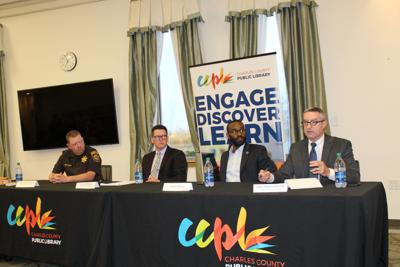
Charles County Circuit Court Judge Patrick Devine, far right, speaks to the crowd gathered for the “So You’ve Been Pulled Over” event at the Waldorf West branch of the library about best practices for one’s day in court following a traffic stop. From left to right next to Devine are Cpl. Steve Bryant of the Charles County Sheriff’s Office, public defender Michael Beach and Assistant State’s Attorney Andre Bruce.
(MD Independent) Staff photo by LINDSAY RENNER-WOOD
In the moment, a traffic stop can be an unnerving experience. If the stop results in a ticket, the ensuing trip through the court system can be just as harrowing and confusing for those inexperienced with or uninformed about the legal system and their rights. Last Tuesday in Waldorf, a group of local legal experts convened at the Waldorf West branch of the Charles County Public Library to demystify the process and make it less scary.
In her introductory remarks before the discussion began, law librarian Mary Jo Lazun of the Charles County Public Law Library said she frequently answers questions from the people who come to avail themselves of the library’s services. One of the most common statements she hears before someone asks their questions, she said, is “So, I got pulled over.” On the basis of the frequency, Lazun said she decided to organize a panel that would be able to let Charles County’s citizens know what their rights and responsibilities are in traffic stops, and what to expect if the stop ends with a ticket or court date.
Cpl. Steve Bryant of the Charles County Sheriff’s Office went first, providing a step-by-step breakdown of how most traffic stops proceed. First and foremost, Bryant said, the officers “try to make [the traffic stop process] easier for you.”
When one notices the officer signaling for them to pull over, he said, it’s best to pull over to the righthand shoulder, away from traffic. He advised that one should keep their hands visible and wait, rather than trying to prepare ahead of time — for their own safety.
“From the back, when we see people digging around … it’s a sign to us that things could be going south,” Bryant said. He also advised the crowd to not argue with the officer during the stop, and to “save it for court,” offering that someone providing an explanation of the circumstances to the officer is not necessarily arguing.
Bryant also reviewed different rights individuals may not know they have during a traffic stop. For example, he said, K9 scans of the vehicle aren’t considered searches by the court, and so people have the right to refuse the K9 and ask for the officer to do it instead. As driving under the influence goes, courts do not admit field breathalyzer tests as evidence, Bryant said, but just having a Maryland driver’s license means you have legally already consented to undergoing sobriety testing at the police station.
Bryant also urged citizens to “comply and complain,” or, obey the officer for the duration of the traffic stop, but afterward file a report if one feels their rights have been violated and do so as soon as possible.
“We want that too,” Bryant said. “If we have officers who aren’t doing the right thing, we want to know.”
Public defender Michael Beach told the crowd that while it’s far from out of the realm of possibility that a traffic stop might be unjustified, one should “absolutely cooperate” during the course of it. “You gain nothing from being uncooperative,” Beach said.
Beach also urged the attendees to never consent to a K9 scan, or to a search, adding that K9 scans aren’t considered searches and there’s “no advantage to saying yes” to such scans.
“If they want to go in your car, they can go in your car,” Beach said. “That’s something to fight in court another day. But if you’ve consented to a search, unless that consent was coerced in some way, you’re pretty much out of luck.”
Beach told the crowd that while it’s important and necessary to be respectful of the officer during the stop, if they start asking questions about destination or the like, one is free to ask for a lawyer or refuse answers under Miranda rights. Respect, however, is crucial: “Respect will always look way better than you getting into it with the officer. … That always gets better results than being confrontational.”
Beach also echoed Bryant’s remarks about filing complaints when one has been treated unfairly by the responding officer, and to remember that the sheriff and state’s attorney are elected officials.
“If you have bad experience, give feedback. If you have a good experience, give feedback,” Beach said. “We all want the officers who are doing everything right — and there’s plenty of them — to be recognized.”
Assistant State’s Attorney Andre Bruce said the first thing, when examining the case, is to make sure there was a valid reason for the stop, and if it’s found to be valid were the circumstances around a search valid as well. Invalid stops, Bruce said, can result in the court dismissing the case entirely.
Bruce and Judge Patrick J. Devine also emphasized the previous remarks on the importance of respect at all points.
“The right time to make a challenge is in court,” Bruce said.
“If you confront the officer, that video may show up in court,” Devine said, adding that a traffic stop is “the wrong time to go off” and that a positive disposition can “neutralize” potential threats.
“You’ve got discretion there. Do that and use it,” Devine said. “Even though the officer is in charge, you have a tremendous amount of control over whether this ends poorly.”
Originally Posted on the Maryland Independent:
